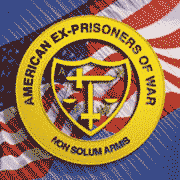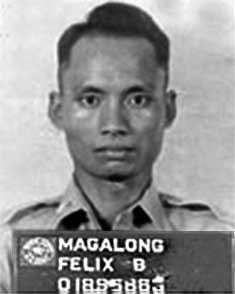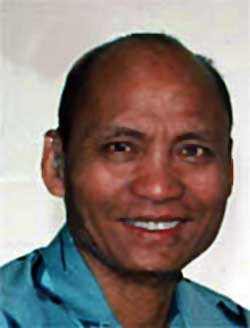
Established April 14, 1942
 |
American Ex-Prisoners of War
A not-for-profit, Congressionally-chartered veterans’ service organization advocating for former prisoners of war and their families.
Established April 14, 1942 |


Felix Magalong After being captured
|

Felix Magalong 1998
|
|
| Last Name | First Name, Middle Init. | Nickname |
| Street Add. | City | State |
| Zip | Spouse | |
| Conflict | Branch of Service | Unit: |
| Theatre of Operation | Military Job | Where Captured |
| Date Captured | Time Interned | Camps |
| Date Liberated | Medals Received | Age at Capture |
| After the War ... | ||
He joined the U.S. Army in 1941 and was assigned to the infantry in Bataan. There he met the Japanese as they set their sights on the Philippines following their success at Pearl Harbor. Capt. Magalong's personal recollection of his capture and the forced march from Bataan en route to Camp O'Donnell, Capas, Tarlac -- via San Fernando, Pampanga, where the prisoners were loaded onto trains to finish the journey -- is brief, simple and poignant.
"On April 1942, we were surrendered to the Japanese Imperial Army by Lieutenant General Jonathan Wainwright at Balanga, Bataan, Philippines. We were ordered to form six lines on the road, and we began what is known as the infamous 'Bataan Death March.'
"Walking under the blistering heat of the April sun, we were a pathetic sight to behold. Coughs, sneezes, and groans were heard throughout the march. Many collapsed from utter exhaustion, intense hunger, and weakness. They were carried or dragged by others to prevent them from being left to the mercy of the guards. We were given no food or water the entire march, except for one occasion when several 32-gallon cans of spoiled cooked rice were served to us. We had to eat this rice or we would be killed. p>"At night, we slept on both sides of the road. Sometimes, these were rice paddies being plowed for the planting season. Other times they were pasturelands with carabao and cow manure, or thick grasses infested with tropical insects. Under these environmental conditions, we tried to sleep in a sitting position to prevent our backs from getting wet and catching a cold.
"Passing by the city of San Fernando. Pampanga we were treated with compassion by the people who lined the road. Wrapped food (rice, fish, and meat) fruits and sugar were thrown to us. Surprisingly, no Japanese guards interfered in this show of compassion.
"I thought of my loved ones, especially my asthmatic mother whose love and sacrifices for me I vividly remember. I thought of my father who also had asthma and who could no longer farm and catch fish. I thought of my sister, Carmen, who sacrificed immensely for me by obtaining a job as a housemaid that I might complete my high school education. I felt helpless and frustrated and a thought came to me several times, that it would have been better to die in Bataan so my parents would benefit from my pension that they would receive.
"From there we marched to the city of Angeles, Pampanga, there we also received the same treatment that we were shown in San Fernando, some of the women even risked everything to come out and hand us the gift of food and bottled water. Once again the soldiers showed no sign of stopping them.
"It was noon when we reached the town of Capas, Tarlac, where camp O'Donnell, a Philippine Army training camp was located. The camp was barren, sandy, and deserted."
Felix was liberated from Camp O'Donnell on December 31 ,1942. At war's end, he made a career out of the military, completing a 30-year career in the Army. He also fought in the Korean War. He and his wife Sandra raised two sons and two daughters.
He graduated with a B.A. degree in Sociology from Metropolitan State College in 1977, graduating Magna Cum Laude; volunteered as a marriage counselor, interpreter, and nursing home assistant; and was past president of the Filipino American Community of Colorado.